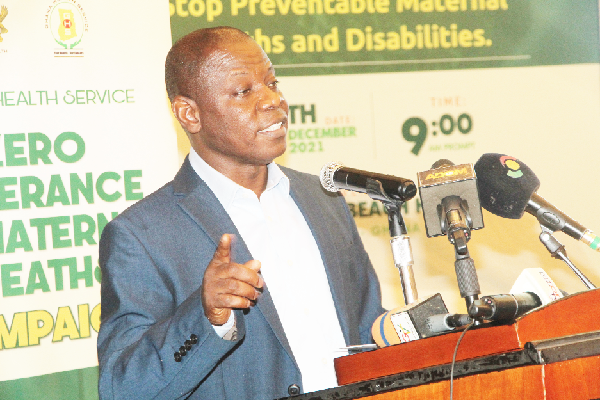
GHS launches campaign to prevent maternal deaths
The Ghana Health Service (GHS) has launched a national campaign to avert all preventable deaths related to pregnancy.
It has been christened “Zero Tolerance for Maternal Deaths”.
Among others, the campaign will leverage public education, stakeholder engagement and quality healthcare services to ensure that no life is lost to maternal mortality.
The campaign also seeks to remove all barriers and unfair treatments that increase the vulnerability of pregnant women and girls to maternal mortality and also push those with unintended pregnancies to indulge in unsafe abortions and other risky actions.
The national campaign is being implemented on the theme: “Stop preventable maternal deaths and disabilities”.
At the launch of the campaign in Accra yesterday, the Director-General of the GHS, Dr Patrick Kuma-Aboagye, said the campaign was critical to accelerating the decline of maternal mortality from 308 out of every 1,000 live births to 70 by 2030 in line with the United Nations Sustainable Development Goals (SDGs).
“The slow decline in maternal mortality in Ghana is of great concern to the Ministry of Health, the GHS and partners,” he said.
Causes
Dr Kuma-Aboagye mentioned the dominant causes of maternal mortality as hypertension, excessive bleeding and unsafe abortion complications.
“The two major causes of pregnancy/child-related deaths are excessive bleeding and hypertensive diseases. While interventions focus on these causes, preventing unintended pregnancies would significantly reduce the risk of maternal deaths,” he said.
He said evidence showed that nearly half of pregnancies were unintended, resulting in unsafe abortions.
“Unfortunately, abortion-related maternal deaths, though highly preventable, remain under-reported due to issues of stigma. For fear of social embarrassment or incurring cost, some women and girls have had to resort to undignified abortions or the use of obnoxious substances that could either end their lives or leave them with life-changing complications, including infertility and psychological trauma.
“The role of family planning in reducing preventable maternal deaths has long been identified and that justifies the new policy of including clinical family planning methods into the National Health Insurance Scheme’s minimum benefit package,” he stated.
“No woman or girl in the country should ever use unsafe abortion due to social stigma or financial limitation. We are looking forward to a society where there will be neither stigma nor unfair treatment to women and girls seeking abortion care.
“Let us remember that abortion care is health care and that is all some women and girls need to survive, Dr Kuma-Aboagye said.
Low hanging fruit
The Director in charge of the Family Health Division of the GHS, Dr Kofi Issah, said the government had made huge commitments towards achieving the SDGs, leveraging Universal Health Coverage.
He said unsafe abortion-related causes of maternal mortality were the easiest to prevent in the country.
“From last year, 5,596 women and girls suffered severe complications from unsafe abortions and 3.2 per cent out of the number resulted in death.
“Almost all these deaths could have been prevented with the use of contraception or comprehensive abortion care,” Dr Issah said.
He added that an integrated and comprehensive strategy had, therefore, been adopted as part of the campaign.
The strategy includes improving financial and physical access to routine maternal health services, capacity building for health professionals, stakeholder advocacy engagements, improving access to family planning services and improving supplies of equipment and drugs.
